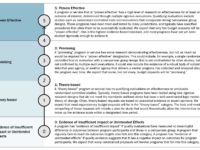Governments must judge hundreds of new programmatic budget proposals each fiscal year with little objective information about whether they will achieve the results claimed. Evidence of program effectiveness is a critical data point that is used when making budget and policy decisions, as programs with greater evidentiary support are generally more likely to deliver a high return on investment of public funds. The The Policy Lab at Brown University leveraged existing public clearinghouses of peer…
Innovation Tag: UX/UI Design
Together with partners from 5 other European countries, the Province of Fryslân developed an innovation model (so-called Tipping Approach) to catalyse and stimulate bottom-up innovations and harness ideas from local stakeholders. Complementing this, a governance model is being developed to provide civil servants with tools to implement these innovations in the social process in a simple and user-friendly way.
The AJSC has developed a new model to measure the determinants of the ‘quality of life’ in Ajman, covering six key areas of public service. The Model comprises a comprehensive factor measurement framework embedded on a sophisticated web-based application, with inbuilt protocols for scientific data collection, project management, data visualization and reporting. It systematically measures gaps and impact of interventions, via targeted performance assessment of framework factors.
Case Study
Procurement Planning Platform (PPP) for driving Sustainability, Circularity and Innovation in Lisbon…
Lisbon Municipality aims for more innovation and sustainability in Public Procurement. Urgency and specifications' complexity are excuses for not considering sustainability in tenders and barriers to attracting innovative SMEs and startups. The innovative approach involved users designing and developing the Procurement Planning Platform, using a rapid development tool, cloud-based, and agile methods, which selects and supports a project-led approach for deploying new procurement strategies.
New Zealand wants our small businesses to be the most digitally enabled in the world. Digital Boost helps owners and employees to build confidence and skills to digitally transform their businesses. Cynefin complexity theory, agile programme development, and public-private partnerships are used to deliver easily accessible learning and services. This includes bespoke playlists of video content, online diagnostic tools, peer-learning support and free or discounted digital equipment or services.…
A proof of concept has been created to incorporate design techniques in many elements of a PoD's life cycle, planning for future demands and overcoming existing hurdles. The proposed strategy prioritizes the needs of persons with disabilities and helps them acquire the resources and services they need. It also helps families gain confidence in caring for a disabled kid. This helps POD engage, lead, create, and sustain life.
Trend Atlas is a digital, interactive platform with rich insights on local and global trends and emerging signals to inform strategic planning, policy development and service redesign. It reduces research time, rework and duplication by breaking down information silos with centralised data and evidence. Built by policy people who upskilled in digital, it combines automation and curation with a sustainable contributor model to create a collaborative and trusted strategic intelligence service.
Case Study
Tertius – An online construction marketplace that easily connects property developers with…
Tertius has resulted in massive productivity gains for the building industry in DC, enabling developers & property owners to book (at a nominal cost) certified third party agency inspections. Outcome: Far more efficient matching of demand & supply for permit inspections, substantially reducing turnaround times. Tertius has driven revenue to the taxpayers, increased regulatory oversight, increased safety in the building community, saving property owners and developers thousands of dollars.
Till 2017, the Ministries and govt. organizations took individual, decentralized & disintegrated initiatives to digitize public services. But most initiatives were facing challenges to provide services due to unplanned design and implementation. To overcome this, Digital Service Design Lab is an innovative method where service providers, service recipients and IT experts design digital services and prepare digitization masterplan together for their respective ministry/org. within just 6-7 days.
e-insan is an integrated platform, offering a wide range of services based on equal opportunity and accessibility for employment and lifelong professional development. In addition, it supports data-driven decision-making processes. The platform provides job and internship opportunities, online training for employees, and many contents of career development for youth and creates a talent pool with verified data. Blockchain-supported e-insan increases efficiency and transparency in HR management.





